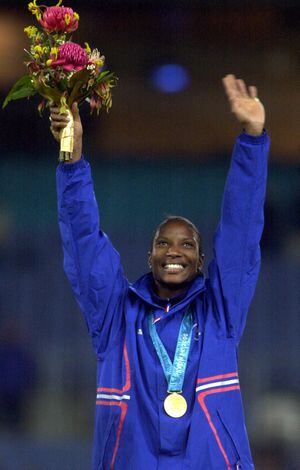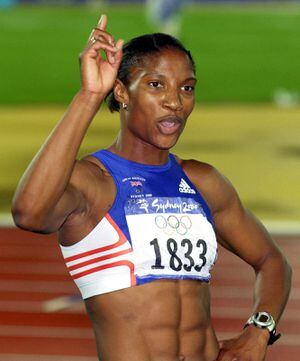Big Interview: Denise Lewis dreams of new golden generation
Having famously reached the pinnacle of her own sport by being crowned Olympic champion, Denise Lewis wants to make it easier for future generations to chase their dream.
Wolverhampton’s golden girl is once more a regular presence on our TV screens, in her familiar role as pundit for the BBC during its coverage of the Commonwealth Games.
Except this time, Lewis has more invested in the action than most.
Since 2015, she has been president of Commonwealth Games England, the organisation responsible for, among other things, ensuring English athletes have the best chance to shine on the Gold Coast.
Lewis and her team have spent time scouting training venues, sourcing sponsors, while also focusing on the many and varied logistical demands of a major championship.
As she explains: “It’s not just a case of wheeling out kit and hoping everyone turns up.”
We meet, for example, at the official announcement of a new sponsorship deal with the energy company, npower.
Such things are often, understandably, overlooked by fans.
Yet for Lewis – and more particularly the athletes – the two are often entwined.
“Funding is tight,” she says. “We’re grateful to have these sponsors come on board.
“Of course it is great for the brand. But it is also about what we can do for the athletes and how we can continue to flourish.”
Lewis replaced double Olympic champion Kelly Holmes in the role after England had finished top of the medals table at Glasgow 2014.
“It has been really interesting, to see what the challenges are across the board in sport,” she says.

“Nothing is ever easy. It’s not a case of rocking up and everything being in place.
“The challenges have been making sure we get the tone right, the right venues. I’m very proud of how venues have been sources for our athletes.
“The checking back and forth, right from the Youth Games, that was important, where we bring on talent, how we can support their pathway through to senior events?”
Though three decades have passed since she travelled each day from Tettenhall’s Regis School to train in Birmingham – Lewis remains hugely passionate and acutely aware of her roots.
“I think I mirror the beginning of many athletes, particularly from this region,” she says.
“There was a lot of travelling, facilities weren’t always brilliant. But having something to focus on, to express yourself, can really turn your life around. It’s that ripple effect, making someone else think differently or join you in that journey.
“I know who helped me along my way – my schoolteachers, from primary to secondary and beyond, my work colleagues.
“They were all behind me because they know that slither of support can make a difference.
“That inspires me. How can we make a difference? How can we give athletes coming through a reason to compete for their country?”
The theme of progression is one continually repeated by Lewis and from an athlete’s perspective is often the very purpose of the Commonwealth Games.
Often referred to as the ‘Friendly Games’ – it has a well-earned reputation as a breeding ground for future stars. There is no better example than Lewis herself, who twice won Commonwealth gold before going on to be crowned champion at the Sydney Olympics in 2000.
“The Commonwealth Games is so, so important. It’s integral to the pathway,” she says.
“If you can win there, it can really hold you in good stead for the future.
“There are athletes going to these championships with no senior international experience.
“In my event for example, the heptathlon, Niamh Emerson has been selected for the first time, a great junior athlete and she’ll be using that opportunity to see how she will handle her nerves.
“It’s a case of: ‘I’m here, I’ve got the vest, let’s see how I acquit myself with the challenges ahead’.
“Being so far away from home, the jet lag, the different time zone and the pressure of being such a big team. It’s very different.
“Then you’ll have the experienced athletes who are at their second or third and will want to go out on a high.”
According to Lewis, those experienced athletes also have a role to play in helping their younger team-mates move up to the next level.
“I think back to my days and it’s like osmosis. You are there in the environment,” she says.
“You could be next to an Olympic champion, for example. You watch how they conduct themselves.
“Everyone talks about the food hall, all the environments where you are under one roof. You learn to manage and listen. Hopefully you are asking questions.
“My experience with the senior athletes, they are imparting knowledge. The fact they are watching you compete. The fact they send you a message if things don’t go right, how they console you of things don’t go well. It’s important as part of that learning and development.
“It is unique, it is special and it’s the launch pad for many athletes who learn to deal with that situation where the numbers are massively inflated compared to world championships. It’s quite a daunting place.”
Though the entire England team consists of nearly 600 competitors, most of Lewis’s attention during the Games will naturally be drawn to the track and field events.
Katarina Johnson-Thompson, Dina Asher-Smith and Wolverhampton’s own Matthew Hudson-Smith are among those who will be going for a gold.

Lewis believes a busy year, with the World Indoors having already taken place and the Europeans scheduled at the end of the summer – has perhaps added another layer of difficulty to a Championship where medals are typically expected rather than hoped for.
“I have always said you have to have a masterplan this year,” she says. “The season was long. It’s always getting longer.
“The ambition is big, we have a great team. But you know the friendly rivalry we have down under it’s not going to be easy. They (the Australians) prepared and up for the challenge.
“The athletes know it is a real opportunity to get some silverware. We’re in the game of getting medals.
“The athletes feel pressure because it’s their expectation. If you’re expecting to medal that’s great because I expect that too.
“A lot of athletes will have gone into the winter with real gusto, there are three big championships, the Commonwealth Games is one they’ll be citing where they can really make their mark.
“Some athletes aren’t able to win on the global stage.
“But they can make sure they deliver in an environment which is welcoming, they’ll have good weather and all things combined the optimistic ones will be looking to do really well.”
Though the time difference will make it far from easy, these Games are likely to be followed closely in the West Midlands. After all, four years from now it is this region which will take centre stage.
The Perry Barr school in which we meet is barely 15 minutes walk from the soon-to-be renovated Alexander Stadium, while a small, until now unremarkable corner of Smethwick will be the home of a new world-class swimming facility.
Lewis has spent the morning running a coaching session for pupils and believes there has never been a better time to begin inspiring the stars of the future. “This is where we start sowing the seeds,” she says.
“Something big is happening to Birmingham – it’s very exciting and children today in four years they’ll be in secondary school and hopefully doing more sport.
“One of these kids might be on the path to being involved in sport in a serious way. Not only that, they may want to volunteer and be part of the fabric of what the Commonwealth Games is.”





